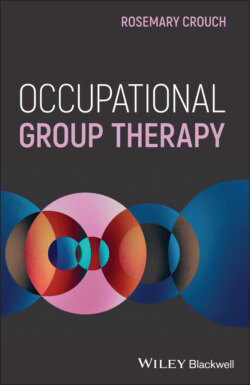Читать книгу Occupational Group Therapy - Rosemary Crouch - Страница 7
Preface
ОглавлениеFootfalls echo in the memory,
down the passage we did not take,
towards the door we never opened,
into the rose‐garden.
T.S.Elloit (Four Quartets)
©1943, Houghton Mifflin Harcourt.
How passionate is one allowed to be about occupational group therapy? It is rather like being passionate about a group of roses. Your admiration of their collective beauty and fragrance encourages you to learn about roses and how to care for them. Your desire to grow them makes you carefully select the ones that will flourish in your garden and you position them with knowledge of their needs. Finally, you set about planting and looking after them. The nurtured product of your endeavours can be likened to the outcome from intervention by occupational group therapy which can be undertaken with groups of people from the young to the old, in different fields of health care.
There has been a remarkable growth and progression globally of occupational therapy into a scientific and meaningful profession with new models, techniques, equipment, research and evidence‐based practice. However one is left with a sense that group‐work in occupational therapy lags behind. There is some evidence‐based research available worldwide on the subject, which will be addressed, but certainly not enough! This book attempts to address this subject by providing a practical guide and teaching manual for both undergraduate and postgraduate occupational therapy students. In this way they may increase their use of group work as a therapeutic intervention and draw inferences from their work which can be researched and published.
It is intended that this book has been written specifically for occupational group therapy intervention and some of the theory may be helpful to other professionals trained in groups.
The uniqueness of occupational group therapy relies on the fact that it is built on the theories of Yalom (1975), Moreno (1987) and Homans (1968) yet is well entrenched in occupational therapy philosophy and models from Canada, the United States, South Africa, the United Kingdom, Australia, etc. From this theoretical background the expertise to use activities of many kinds, which are the backbone of the occupational therapy profession, are woven into the dynamics of the group in a very effective manner.
The undergraduate occupational therapy curriculum covers client handling extensively as well as structuring and communicative skills, together with the therapeutic use of self. These are the ingredients for an effective group leader who excels in the functional and performance aspects that people need to develop.
Often we hear the words ‘I don't feel confident and lack the experience to be a group leader’. Hopefully this is where this book comes in. Self‐confidence is a quality that needs nurturing and practice within the occupational group therapy field. Make sure the essential learning is in place, attend experiential workshops for self‐growth and use the guidelines and suggestions in this book to guide you.
The most effective group leaders are those who attend to the needs and feelings of group members in the present time and structure of the group, so that the stated goals are achieved (Health promotion Unit, NSW, Australia 1968). Choose your place and your clients, feed them and nurture them to the best of your ability and watch them grow.
You can walk down the passage of occupational group therapy, open the door, and admire your strongly growing, fragrant roses!
This book is being published in the midst of one of the most difficult times in the history of the world – the Covid 19 pandemic! However this does not change the fact that people still suffer from psychiatric, mental and psychological problems. In fact it exacerbates the problem. Occupation becomes paramount, especially during the lock‐down and the World Federation of Occupational Therapists (WFOT), and many countries and many countries have addressed this concept bringing occupational therapy to the forefront as an essential profession. As far as group work is concerned, it is clearly difficult to undertake group therapy whilst group members have to keep at a distance from one another and wear masks, but it is possible. Intervention is clearly compromised.
I wish to thank all occupational therapists who have persevered during this time and also my husband Michael who is a great support and experienced editor.
